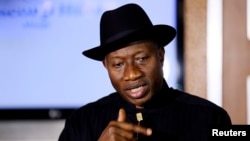Goodluck Jonathan’s plan to run for a second term as president of Nigeria has been among the country’s biggest open secrets for months. So why did he wait until almost three months before the election to announce his candidacy?
Jibrin Ibrahim, director of the Center for Democracy & Development in Abuja, says Jonathan had planned to declare his candidacy earlier in the year after touring the country, but the fight against the Boko Haram insurgency and the group’s kidnapping of more than 200 schoolgirls from the northeastern town of Chibok in April sidetracked his plans.
“There’s been a large outcry against that, so that’s why he suspended the zonal tour at the end of which he was to make the announcement," Ibrahim explained. " Right now he had to make his declaration because the timetable has come for party primaries and it's necessary for him to openly admit what he had wanted to do all along, which is to contest for a second term.”
Jonathan’s main opponent will likely come from the All Progressives Congress, a new coalition of opposition parties formed last year. Former military ruler Mohammadu Buhari is expected to be the party's presidential candidate.
The APC is seen as the biggest threat to Jonathan’s People’s Democratic Party, which has held power since the restoration of democracy in 1999.
But the APC has done little to distinguish itself from its opponent, according to Clement Nwankwo, executive director of the Abuja-based nonprofit Policy and Legal Advocacy Center.
“The opposition party has not been able to concretize a message for the election, a message that appeals to people, it hasn’t come up with alternative programs that people can see and make a difference, in terms of the difference between themselves and the president who is in office. So I really worry that in terms of substance the opposition party has not been able to articulate a strong enough message that would resonate with people," Nwankwo said.
With a population of over 173 million people of different ethnicities spread across 36 states and divided nearly evenly between Muslims and Christians, Nwankwo says people are likely to choose their candidates based on where they’re from or where they pray, rather than whether they’re the best-qualified to run the country.
“Unfortunately, I worry that the politics of the country has been clouded so much by ethnicity, by religion, and what is called zonal politics where people have been fed with messages that suggest that unless someone from their particular ethnic group or religion is in office that they would have no advantage, which would really be unfortunate, because there are several issues that should be of concern to Nigerians," Nwankwo said.
Nigeria’s presidential elections are scheduled for February 15 of next year.




